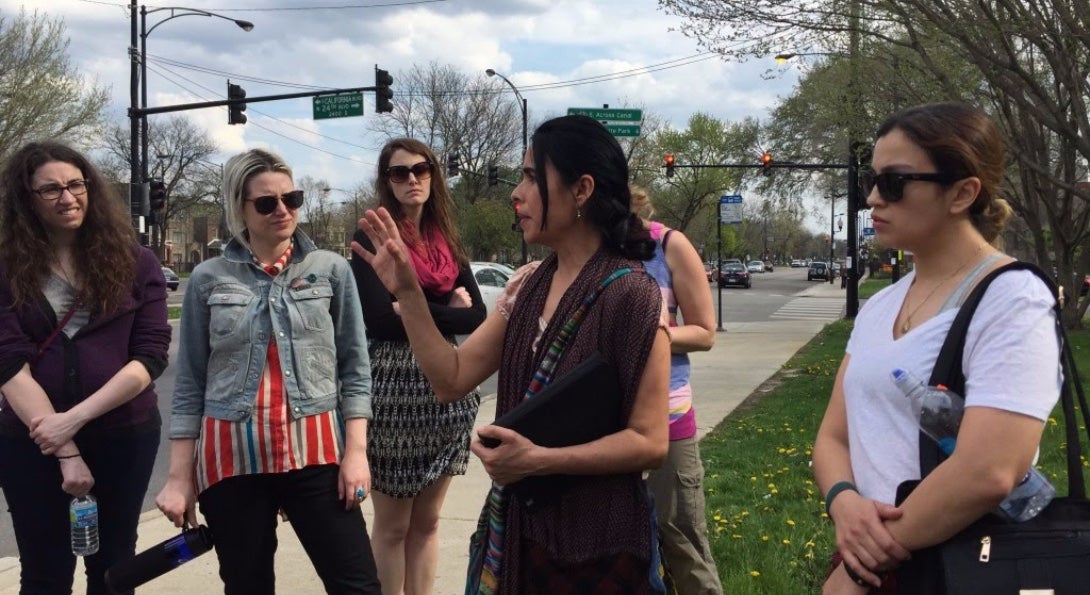Aligning public health courses with community needs
About the initiative
All future inquiries regarding Community Course Alignment can be directed to the Community-Engaged Teaching & Learning (CEnTL) Initiative Project Coordinator, Emily Etzkorn, at eee2@uic.edu.
Community Course Alignment is a program within the Community-Engaged Teaching & Learning (CEnTL) Initiative (which the Collaboratory previously housed) to help enhance student learning while supporting the concrete needs of community organizations working towards health justice.
- It is a core competency for students in MPH programs to be able “to identify individual, organization and community concerns, assets, resources, and deficits for social and behavioral science interventions” (ASPPH, 2021).
- By applying classroom lessons through hands-on learning opportunities with community partners, students gain the opportunity to engage with a wider range of community voices and community engagement theories and methods to better prepare students to meet community public health needs (Levin et al, 2021).
- Teaching in tandem with community organizations helps facilitate meaningful, sustainable academic-community partnerships (Zou et al., 2019).
Course matching was piloted in Spring 2022 with a selection of community-based organizations (CBOs) that have an ongoing relationship with the School of Public Health. Future iterations of course matching will be open broadly to CBOs which are interested.
How SPH faculty can get involved
Frequently asked questions on course alignment
List of frequently asked questions and answers
What organizations are considered “community-based”? Are local health departments considered community-based organizations (CBOs) for this effort?
We are including public, non-profit, or informal organizations that are focused on meeting the needs of the communities in which they reside. There may be some collaboration with health departments, but the Collaboratory for Health Justice will focus particularly on neighborhood organizations such as mutual aid organizations, grassroots community groups, and other entities made up of residents from the communities of focus.
What are some example assignments or activities that students would conduct with CBOs?
- Program evaluation: students in survey methods courses could design a survey to assess and measure the outcomes of the CBO’s services
- Data analysis: students can analyze existing data (quantitative or qualitative) collected by the CBO and collaborate on interpretation and application
- Program planning: a team of students could review an organization’s program portfolio to determine how well its programs are aligned with its mission and goals.
- Needs assessment: students could interview organization staff to determine the organization’s assets and opportunities for growth; or collaborate on a regional Community Health Assessment
- Training/outreach: students can prepare a training about a health issue along with information about what the CBO is doing to address the issue. Students can then interview community members about how much they know about the CBO and its relevant services
Will there be compensation for partner organizations? What about compensation for instructors?
Both community organizations and instructors will be compensated according to the commitment required for the project. Community partners will also be offered other benefits as part of building reciprocal partnerships, potentially including access to the UIC library, invitation to SPH events, and additional opportunities to partner with UIC students, faculty, and researchers.
Course example: Community Organizing for Health (CHSC 584)

This course is taught by Jeni Hebert-Beirne, PhD, interim associate dean for community engagement, and Dolores Castañeda, research associate and PhD in Community Health Sciences student. With a focus on community organizing for health, the instructors value real-life examples of community organizers who are engaged in public health and is always looking to integrate guest speakers. A regular assignment of the class is for students to interview a community organizer. Each semester, the instructor collaborates with an organization to create a project where students collect, analyze, and/or interpret data for use by community organizers.